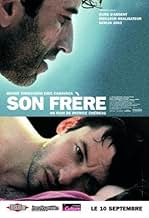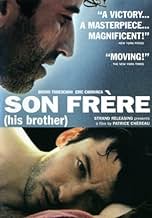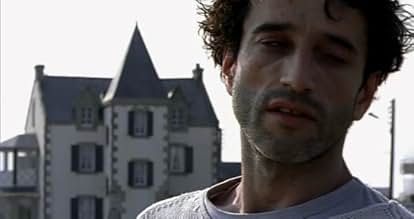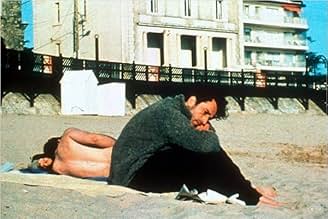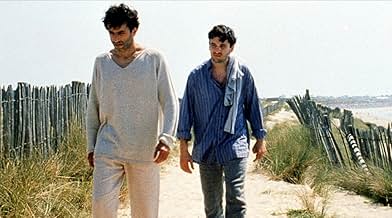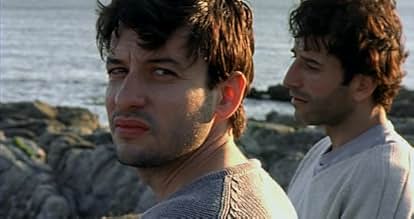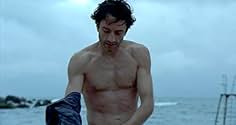Agrega una trama en tu idiomaTwo brothers with a problematic relationship in the past, find together again when the elder one gets a dangerous disease and asks his brother to accompany him to several doctors.Two brothers with a problematic relationship in the past, find together again when the elder one gets a dangerous disease and asks his brother to accompany him to several doctors.Two brothers with a problematic relationship in the past, find together again when the elder one gets a dangerous disease and asks his brother to accompany him to several doctors.
- Dirección
- Guionistas
- Elenco
- Premios
- 2 premios ganados y 4 nominaciones en total
- Dirección
- Guionistas
- Todo el elenco y el equipo
- Producción, taquilla y más en IMDbPro
Opiniones destacadas
Breaking with the visual pyrotechnics and operatic flourishes he's been associated with in the past, this devestatingly intimate drama solidifies Patrice Chereau's reputation as one of the greatest filmmakers of our time. The simple story (adapted by Chereau and Anne-Louise Trividic from Philippe Besson's novel) deals with two somewhat estranged brothers -- one gay, one straight -- who become reconciled when one of them (the straight one) contracts a rare blood disease and begins the process of dying. As the slightly smug, high-living brother brought low by death Bruno Todeschini is excellent as always. But the revelation is Eric Caravaca as the surviving brother. His fresh, unfussy performance grows in power as the situation goes from bad to worse. Catherine Ferran as the perfectly professional, but utterly unhelpful, doctor in charge is quietly frightening. Chereau regulars Sylvain Jacques and Pascale Greggory drop in for a telling turn or two, and Maurice Garrel (father of filmmaker Philippe Garrel) has a few nice scenes as an old man they meet at their beach house. But over all it's primarily a two-hander of intense intimacy. There's no music until the climax when the voice of Marianne Faithfull let's loose on the soundtrack with a song she co-wrote with Angelo Bandalamenti. And when the end credits finally roll you'll probably find yourself staggering out the door like I did. If you've ever lost someone close to you you'll feel this movie right inside your skin.
If you know Chéreau mainly by his version of Alexander Dumas' novel La Reine Margot or maybe even more famous adaptation of Hanif Kureishi's Intimacy, get ready for something very different. His brother is not history based, there are no mass scenes or attractive dissolute individuals, there are no explicate sex scenes, only delicate human story of illness demystification, complicated family relationships and about love in general. You need patience, compassion and strong stomach for this film. About two thirds of the audience left the cinema before the end. I did not even think about it. I loved it. It was unforgettable. Thomas and Luc are brothers who had lost their closeness long time ago and do not keep in touch until the older one gets strange sickness. Thomas' blood cannot coagulate, doctors are not capable to help, his girlfriend leaves him, his parents argue at his bedside and the only one who stays besides him is his younger brother. Entirely confused and unprepared, in the beginning Luc resists the need to stay with his brother. In a sad hospital surrounding he meets every day a cold doctor, dense nurses and quiet, resigned patients. With no disgust, Chéreau shows plenty of ugly scars, wrinkled skin, hairs, bruises, shiners and burdensome long lasting medical procedures that are not pleasant for sure, but do prepare for death. The sequence where Luc meets nineteen-year old Manuel is astonishing. Gay-oriented man notices Manuel's big eyes and gorgeous lips, still present traces of unusual beauty. During the spontaneous chat with this cut-like-a-piece-of-meet boy full of wounds and scars Luc feels more empathy and warmth than he feels for his own brother. An affecting scene when Manuel's and Luc's hands touch will later repeat with Thomas, when closeness they used to have in their childhood is re-established between two brothers. Retrospectively mixed events unavoidably lead to the fact they are left all alone, with no partners and parents, aware of inescapable death. The act of dying will not be shown so there will be no real cathartic discharge. The right song used at the right place provokes so appalling shudders that every future listening to the same song will surely bring them back. The bitter voice of Marianne Faithful in "Sleep" from her album "A secret life", the song so beautiful and so sad conjures the climax up. This is where the soundtrack starts and ends. Ashes to ashes, dust to dust, as the song says.
10EdgarST
This was Chéreau's best since "L'homme blessé", an excellent little film about affection, compassion, brotherly love, death, courage. The proposed situation (an older brother dying from a blood disease seeks the support of his younger brother, somehow evoking the most critical days of the spread of AIDS) is handled with a calm tone, in a rather "Cartesian approach", not lacking bursts of emotion, but avoiding facile sentimentality. Fine script by Chéreau and Anne-Louise Trividic, from a novel by Philippe Besson, with a clever structure intersecting different planes of time, plus good performances all over, especially by Bruno Todeschini and Éric Caravaca, and firm direction by Patrice Chéreau.
A film about death. and brotherhood. and the fight against yourself. and need of the other. and about forms of hope. all simple reflections of interior fights and profound intimacy, about fear and need to be near the other who represents, in real sense, part from yourself. a film as testimony about the genius of a great director. and about subtle, precise, touching acting. because it is one of the films with basic status as mirror for states of soul. the story as pretext for deep honesty. poetic. and cruel.
8B24
When I saw this film recently on the Sundance Channel, I had no advance knowledge of it. That is how I prefer to watch any film, but publicity -- being what it is -- usually stands in the way of any such cleanly objective approach.
In this case, the story is told in segments that play around with chronological time yet achieve an overall effect of linearity. Central to the film are scenes in the hospital that capture as no other film I have seen the stark and compressed place where life and death coexist. Normally that suggests soap opera bathos, as in such TV dramas as ER or General Hospital. But here is only an overwhelming display of truly remarkable clinical minutiae, against which an inner drama between the characters is allowed to play out either in silence or in visual takes showing the characters reacting to an unfolding revelation of who they really are and how they relate to each other. The director achieves his goal through understatement, with few exceptions. Quintessentially French.
Even the love scenes, such as they are, have a clinical feel to them. If I have one negative comment, it is that the film lacks any contrasting relief from its lugubrious tone, no touch of irony or brief bit of self-effacement. Small wonder some viewers may find it flat or uninspiring.
Yet the tacit theme of finding new ways of looking at oneself through suffering and change stands out. The two brothers are seen to rekindle a relationship that had been lost or misplaced, even as death approaches inexorably. I would not mind sitting through it again to examine more closely some of its subtleties hiding behind the sledgehammer reality of hospital life.
In this case, the story is told in segments that play around with chronological time yet achieve an overall effect of linearity. Central to the film are scenes in the hospital that capture as no other film I have seen the stark and compressed place where life and death coexist. Normally that suggests soap opera bathos, as in such TV dramas as ER or General Hospital. But here is only an overwhelming display of truly remarkable clinical minutiae, against which an inner drama between the characters is allowed to play out either in silence or in visual takes showing the characters reacting to an unfolding revelation of who they really are and how they relate to each other. The director achieves his goal through understatement, with few exceptions. Quintessentially French.
Even the love scenes, such as they are, have a clinical feel to them. If I have one negative comment, it is that the film lacks any contrasting relief from its lugubrious tone, no touch of irony or brief bit of self-effacement. Small wonder some viewers may find it flat or uninspiring.
Yet the tacit theme of finding new ways of looking at oneself through suffering and change stands out. The two brothers are seen to rekindle a relationship that had been lost or misplaced, even as death approaches inexorably. I would not mind sitting through it again to examine more closely some of its subtleties hiding behind the sledgehammer reality of hospital life.
¿Sabías que…?
- Bandas sonorasSleep
Performed by Marianne Faithfull
Written by Marianne Faithfull, Frank McGuinness (as Frank McGuiness), Angelo Badalamenti
© ANLON MUSIC Co. (P) 1995 ISLAND RECORDS INC.
Avec l'aimable autorisation de Universal Music Projets Spéciaux
Selecciones populares
Inicia sesión para calificar y agrega a la lista de videos para obtener recomendaciones personalizadas
- How long is His Brother?Con tecnología de Alexa
Detalles
Taquilla
- Total en EE. UU. y Canadá
- USD 22,834
- Fin de semana de estreno en EE. UU. y Canadá
- USD 6,802
- 4 abr 2004
- Total a nivel mundial
- USD 131,195
- Tiempo de ejecución
- 1h 32min(92 min)
- Color
- Mezcla de sonido
- Relación de aspecto
- 1.85 : 1
Contribuir a esta página
Sugiere una edición o agrega el contenido que falta

